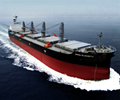BP starts up first new ACG oil platform in 10 years off Azerbaijan

BP and its partners have launched output from the first new production platform to come on stream in a decade at Azerbaijan’s flagship ACG oil field complex in the Caspian Sea, the UK company said April 16.
In a statement, BP said production from the $6 billion Azeri Central East project should reach 24,000 b/d by the end of 2024 as a second and third well are brought on stream, adding to the well just started up.
It described the ACE platform as its most advanced globally, both digitally and technologically, and capable of being controlled from shore. Both the platform jacket and topsides were built in Azerbaijan, it noted.
The facility, able to handle up to 100,000 b/d of crude, is critical to averting the decline in production from the ACG (Azeri Chirag Gunashli) oil project, which makes up the bulk of Azerbaijan’s oil production, exported under the high-value Azeri Light brand.

Azeri Light, loaded at Ceyhan on Turkey’s coast, was assessed by Platts at a 24 cents/b premium to Dated Brent on April 15.
The grade is valued by refiners for production of middle distillate and light products such as jet fuel and diesel, although recent attacks on Red Sea shipping have limited crude exports out of the East Mediterranean and Black Sea region to Asia. Platts is part of S&P Global Commodity Insights.
Multi-decade production
The ACE platform is expected to produce up to 300 million barrels of oil over its lifetime, BP said, adding, “with future continual major investments in new technologies and facilities, and other efforts to maximize field recovery, [ACG] is expected to continue to produce as a world-class reservoir for many decades.”
Analysts at S&P Global Commodity Insights expect an uptick in Azerbaijan’s crude production over the next couple of years, with levels set to exceed 500,000 b/d in 2026 — supplemented that year by around 120,000 b/d of condensate.
“The ACG megaproject remains the chief driver of the overall Azeri crude oil production trend during 2024-25 in the S&P Global base case, and we assume the full realization of the Azeri Central East project, which will ultimately add 300-360 million barrels (41 million-49 million mt) to total production from the new platform, reducing the project’s overall rate of decline,” John Webb, director of the company’s Russian & Caspian Advisory Service, said.
BP earlier said it planned to step up drilling at the existing ACG assets in 2024, with 12 new production wells planned in addition to the drilling at ACE. In January 2024 the UK major also launched a five-year, $370 million 4-D ocean-bottom seismic survey to better define opportunities at ACG. Plans for a separate deep gas project below the ACG complex are also underway — not thought to be part of the existing ACG production sharing agreement.
“This successful start-up is testament to the ongoing close collaboration between BP, Socar and the government of Azerbaijan, together with the support of our partners,” BP regional president Gary Jones said. “First oil from ACE — in the year of the thirtieth anniversary of the agreement to develop ACG — marks the beginning of this world-class field’s next development phase.”
ACG crude production has been in long-term decline, falling 13% to 363,000 b/d in 2023, although Azeri Light volumes have been supplemented with condensate from the Shah Deniz gas complex, as well as third-party volumes from Kazakhstan and Turkmenistan.
The grade is now almost exclusively exported via the Baku-Tbilisi-Ceyhan (BTC) pipeline to Turkey’s Mediterranean coast, with an alternative route to the Black Sea virtually halted since the start of Russia’s full-scale invasion of Ukraine in 2022.
The new platform marks a shift in the focus of drilling at ACG to target a shallower, less prolific formation compared with the original Pereriv formation, known as Balakhany, with greater provision for gas and water injection to maximize production.
Multinational PSA
In 2017 the ACG production sharing agreement was extended by 25 years to 2049, with BP reducing its stake from 35.8% to 30.37%, and state-owned Socar increasing its stake from 11.6% to 25%, as well as reductions in the stakes of other partners.
Chevron went on to sell its stakes in both ACG and the BTC pipeline to Hungary’s MOL in 2020.
Alongside BP and Socar, the stakeholders are now MOL on 9.57%, Norway’s Equinor on 7.27%, ExxonMobil on 6.79%, Turkey’s TPAO on 5.73%, Japan’s Itochu on 3.65% and India’s ONGC Videsh on 2.31%.
Source: Platts

 Hellenic Shipping News Worldwide Hellenic Shipping News Worldwide, Online Daily Newspaper on Hellenic and International Shipping
Hellenic Shipping News Worldwide Hellenic Shipping News Worldwide, Online Daily Newspaper on Hellenic and International Shipping





















 PG-Software
PG-Software